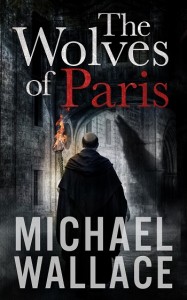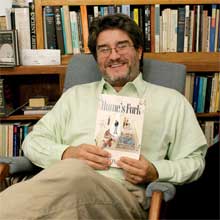PREVIEW OF OUR FEBRUARY 1 GUEST BLOGGER, MARTHA JOHNSON
2/1/14 – PREVIEW OF OUR FEBRUARY 1 GUEST BLOGGER, MARTHA JOHNSON
Executive-turned-writer Martha Johnson explains why she can’t separate her fiction and non-fiction writing personas.
2/1/14 – PREVIEW OF OUR FEBRUARY 1 GUEST BLOGGER, MARTHA JOHNSON
Executive-turned-writer Martha Johnson explains why she can’t separate her fiction and non-fiction writing personas.
 1/26/2014 – THE WOLVES OF PARIS, A REVIEW
1/26/2014 – THE WOLVES OF PARIS, A REVIEW
Stories about vampires and werewolves have been around for centuries but Michael Wallace manages to bring a fresh take to the old tale. Far afield from his stories about Later Day Saints enclaves in scrubby patches of desert, in The Wolves of Paris, Wallace takes us back centuries to 1450 to weave a tale of sorcery and deceit.
1/23/14 POINT OF VIEW: WHO TELLS THE STORY?
“There must have been some movement, a gesture, because every person in the living room would later remember a kiss.” (Ann Patchett, Bel Canto)
Sally Whitney’s lament [LLNB 1/10/14] that most contemporary stories are written from the limited viewpoint of one or a few characters, hit me in all my writerly places. Powerful stories can grab
1/20/13 INTERVIEW WITH AUTHOR, PUBLISHER EVA KAPITAN, A FEW GOOD BOOKS PUBLISHING
 Q: I’ve read and enjoyed two of your cozy mysteries, Lovers, Grapes and Crimes and the forthcoming Murder at the Wine Cask Inn. Plots and characters are madcap, like a ’30s movie—I think of Hepburn in Bringing Up Baby. Where do the ideas for your books and the people in them come from?
Q: I’ve read and enjoyed two of your cozy mysteries, Lovers, Grapes and Crimes and the forthcoming Murder at the Wine Cask Inn. Plots and characters are madcap, like a ’30s movie—I think of Hepburn in Bringing Up Baby. Where do the ideas for your books and the people in them come from?
1/17/14 — THE ACCIDENTAL AUTHOR
Erika Rybeck lives at Riderwood Retirement Community in Silver Spring, Maryland. She intended to put together an album of her life for herself, family and friends. She wrote a narrative to accompany the many photos she had acquired from her childhood and school years.
1/13/14 – WROTE THE BOOK, HATED THE MOVIE (Part 2)
“If there’s one thing I hate, it’s the movies. Don’t even mention them to me.” (The Catcher in the Rye, J.D. Salinger)
Last month I wrote about the daggers that rip through an author’s heart when the “wrong” actor gets cast in the movie version of his/her book. But as much as it hurts to see a beloved character misrepresented, it’s even worse when changes to carefully crafted tone and plot spawn a film that an author feels buries (or even loses) the original intent of the book. Listed below are a few authors who would rather you read their book than watch its movie adaptation.
1/10/14 –WHO KNOWS WHAT? THE PERKS OF A NARRATOR WHO SEES ALL
Story narrators who know everything are out of fashion. Readers today want to be close to characters. They want to experience events of the story the same way the characters do—the way any of us experiences the world—knowing only what we have seen, heard, or been told. Approaching a story like this has spawned a lot of novels written from one or maybe a few characters’ points of view, but it seems to me that as readers, we’re missing something by not seeing the larger picture. And as writers, first-person and third-person limited viewpoints restrict the richness of the worlds we create.
1/7/14 – STONER: IT’S TIME YOU READ THIS BOOK
A few months ago, the New Yorker reviewed Stoner under the headline, “The Greatest American Novel You’ve Never Heard Of.” It was a clever line, but after Britain’s Waterstones named it the Book of the Year for 2013—and with U.S. sales finally topping 100,000—it may no longer be true. Admittedly, it’s taken 48 years to get to this point and the novel is still far from a popular favorite, but it’s clearly beginning to get the attention it deserves.
 1/4/14 – BECOMING A POET IN MID-LIFE: PETER M. GORDON, POET
1/4/14 – BECOMING A POET IN MID-LIFE: PETER M. GORDON, POET
For anyone who views a writing career as an impossible dream, poet Peter M. Gordon is an inspiration. After a 30-year career in creative work that has included theatre directing, writing, teaching, and television programming, Peter reinvented himself as a poet after the age of 50 – and very successfully so.
12/17/13 — A TEAM EFFORT TOUGHER THAN FOOTBALL
After giving a talk recently about self-publishing, I received a series of plaintive emails from one of the participants who wanted to know why her book had been on Amazon.com for a year without one sale. I asked her if she belonged to the Maryland Writers’ Association, MidAtlantic Book Publishers Association or any association that might provide the help she needed. “No,” she said, “they all want money for dues.”
Well, yes, but for a fledgling writer, the money is nominal and well spent.
12-13-13 – WROTE THE BOOK, HATED THE MOVIE
“I cried when I saw it. I said, ‘Oh, God, what have they done?'”
“…I was deeply disappointed.”
It was “crummy.”
Ouch. This isn’t what movie directors want to hear after a screening. Worse, these comments came not from random viewers, but from the authors of the books on which each film was based. (Which author said which is noted at the end of this post.)
Although authors dream of seeing their stories come alive on the big screen, it’s also a scary proposition.
12/10/13 – INTERVIEW WITH ANTON DiSCLAFANI, AUTHOR OF THE YONAHLOSSEE RIDING CAMP FOR GIRLS
Last month, in my review of The Yonahlossee Riding Camp for Girls, I talked about
what a fascinating character Thea Atwell is. She’s also a controversial character. The New York Times called her “an impetuous, headstrong heroine, who often seems like a 1930s version of Scarlett O’Hara.” NPR Books said she’s a “budding feminist,” and The Boston Globe suggested she’s “impossible to like.”
Given the complexity of this character, I couldn’t wait to interview Anton DiSclafani, the author who created her.
12/7/13 — THE LETTERS OF EDITH WHARTON
When I was having trouble with the first chapter of a novel I was writing, a good friend and writing mentor suggested I take another look at Edith Wharton’s The House of Mirth. Its first chapter is a classic; it not only draws you into the story but it also lays the groundwork and foreshadows everything that is to follow.
In fact, the opening was so good I couldn’t stop and quickly reread Wharton’s wonderful classic. But as I put it back on my shelf, my eye caught the volume next to it: The Letters of Edith Wharton, edited by her Pulitzer prize-winning biographer R.W.B. Lewis and his wife, Nancy Lewis. And what a marvelous treasure that turned out to be.
12/4/13 – SLOGGING THROUGH THE CLASSICS
I spent high school immersed in Victorian novels. My purse contained four typed 9×11 sheets listing classic works that every “college-bound” student should read, and every year I dutifully read and crossed more of them off. I defended these books vociferously for their timeless ideas, eschewing more contemporary writing, most of which, I was sure, had only ephemeral value. Though I was writing fiction of my own even back then – and certainly wanted people to read it – my goal was to write something timeless, and I thought my greatest guide to doing so would come from reading other timeless works.
THAT PRIVATE AND TYPICALLY UNCOMFORTABLE FEELING–IT’S A DIRTY FEELING–THAT SOMEONE IS READING OVER YOUR SHOULDER
Never once having blogged before, and writing on an Olivetti version of Word that does not recognize “blogging” as a verb (its two iterations already in this text have been underscored with disapproving red squiggles), I find myself, even now as I blog, seeking a heritage style of composition that may slide smoothly into this more recent convention,
 11/29/13 PREVIEWING OUR 12/1/13 GUEST BLOGGER JOHN BECKMAN, WHOSE FIRST NOVEL THE WINTER ZOO WAS A NEW YORK TIMES NOTABLE BOOK OF 2002 AND WHOSE FORTHCOMING AMERICAN FUN: FOUR CENTURIES OF JOYOUS REVOLT IS ALREADY HIGHLY PRAISED
11/29/13 PREVIEWING OUR 12/1/13 GUEST BLOGGER JOHN BECKMAN, WHOSE FIRST NOVEL THE WINTER ZOO WAS A NEW YORK TIMES NOTABLE BOOK OF 2002 AND WHOSE FORTHCOMING AMERICAN FUN: FOUR CENTURIES OF JOYOUS REVOLT IS ALREADY HIGHLY PRAISED
Kirkus Reviews said The Winter Zoo was “potent and deeply disturbing…the work of a most ambitious and unquestionably gifted writer.”
The New York Times said: “The hero of this first novel, a young man newly arrived in Poland from Iowa, trades his naivety for lessons in youthfulness; Beckman captures the rush of freshly liberated desires in post-Communist Europe.” Beckman taught literature in Poland and France before becoming a professor of English at the United States Naval Academy.
During this holiday, when we should reflect on what we are most thankful for, I am thankful for the Marines.
Of course, I’m thankful for all the men and women who currently serve, thankful for my fellow veterans and retirees who have served in every branch, but it’s the Marines with which I have a special reason for thanks.
My gratitude began with a question posed by my literary agent when she asked me if I would be interested in co-authoring a memoir. I paused for several seconds then answered honestly. “I’ve never written memoir before.”
“Would you like to try?”
My simple yes was followed by a project that changed my life.
Shoshana Johnson had survived a deadly ambush, had been shot through both of her ankles and taken prisoner by a mob of Iraqis in the early days of the war.
 11-23-13 INTERVIEW WITH JUSTIN KRAMON, AUTHOR OF THE PRESERVATIONIST
11-23-13 INTERVIEW WITH JUSTIN KRAMON, AUTHOR OF THE PRESERVATIONIST
Last month, I reviewed Justin Kramon’s new thriller The Preservationist. This time, I interview the author. When I first met Justin Kramon in 2010, he spoke to the Annapolis Chapter of Maryland Writers Association about his well-received first novel Finny. His vivid characters and confident writing style were impressive for an author still in his twenties. I interviewed him then for MWA’s Pen in Hand. He continues to be a thoughtful and engaging interviewee.
11/20/13 AN INTERVIEW WITH AUTHOR RON COOPER. (SEE ALSO HIS GUEST BLOGGER POST ON NOVEMBER 1, BELOW, AND MY REVIEW OF HIS ACCLAIMED NOVEL PURPLE JESUS ON OCTOBER 20.)
 Q: Your novels, Hume’s Fork and Purple Jesus, take us into the lives of the rural underprivileged. In The World Republic of Letters, Pascale Casanova says: “…the birth of the American novel may be said to coincide with the use of the oral language in Mark Twain’s Huckleberry Finn… insisting upon a specific idiom freed from the constraints of the written language…” Purple Jesus is in the tradition Twain started, its characters far free of constraints, language-wise. What are you writing now, who’s at the focus, where’s it set? Will idiom be as much a part of the characters, or are you venturing otherwise?
Q: Your novels, Hume’s Fork and Purple Jesus, take us into the lives of the rural underprivileged. In The World Republic of Letters, Pascale Casanova says: “…the birth of the American novel may be said to coincide with the use of the oral language in Mark Twain’s Huckleberry Finn… insisting upon a specific idiom freed from the constraints of the written language…” Purple Jesus is in the tradition Twain started, its characters far free of constraints, language-wise. What are you writing now, who’s at the focus, where’s it set? Will idiom be as much a part of the characters, or are you venturing otherwise?
11/17/13 MYSTERY LOVES COMPANY
Would you like to go where they really know your name? Better yet, if you read mysteries, they know what you want to read?
Try your local independent mystery bookstore. I drove across the Chesapeake Bay Bridge last week to the quiet shores of Oxford, Maryland, to drop in on Kathy Harig and the Mystery Loves Company Bookstore. An energetic woman with short white hair wearing a blue turtleneck and corduroy slacks, Harig greeted me with a smile as she waved good-bye to a woman bemoaning the fate of two handsome oak trees in town. The store is on the main street in a building dating from 1900—it’s on the Historic Register–and used as a bank and then a post office for 30 years each.